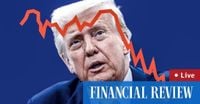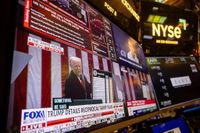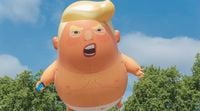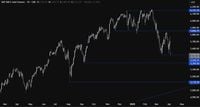Wall Street is in turmoil following President Donald Trump's announcement of sweeping tariffs, sending shockwaves through global markets and raising fears of a potential recession. As investors reacted to the steepest American tariffs in a century, the S&P 500 Index plummeted over 4% on April 2, 2025, erasing approximately $2 trillion in market value. The Nasdaq Composite fared even worse, shedding 5.2% as major tech stocks like Apple and Nike faced significant declines due to their reliance on manufacturing in China and other Southeast Asian nations.
By midday, the S&P 500 had dropped to a critical level of around 5,500, which some analysts consider a psychological threshold for market stability. The index's more than 3% tumble at the open put it on the brink of a longer-term correction, raising concerns about the potential for further declines if the market cannot stabilize. The Cboe Volatility Index, a key measure of market fear, briefly topped 29, signaling heightened anxiety among traders.
In response to the tariffs, which included a 10% levy on Australian exports, China and the European Union have vowed to retaliate. Other trading partners like South Korea, Mexico, and India are holding off on immediate responses as they seek concessions before the tariffs take effect on April 9. The uncertainty surrounding these international relations is contributing to the volatility in the markets.
The impact of these tariffs is not limited to the United States. Australian shares are expected to extend losses amid the global sell-off, with ASX futures indicating a drop of 0.5% to 7839 points. Economic analysts predict that the trade war will lead to a global slowdown, which could force the Reserve Bank of Australia (RBA) to cut interest rates up to four times in 2025. This sentiment was echoed by Goldman Sachs, which estimates that nonfarm payrolls in the U.S. rose by 150,000 in March, slightly above consensus expectations, but below the three-month average.
Despite the turmoil in the U.S. markets, Mexico's stock market experienced a surprising surge, with the benchmark Mexbol index jumping 2% to its highest level since July. This rally was driven by financial companies that were spared from the latest tariffs, showcasing the uneven impact of Trump's trade policies.
As traders brace for further developments, all eyes are on Federal Reserve Chairman Jerome Powell, who is scheduled to deliver a speech on the economic outlook at the Society for Advancing Business Editing and Writing Annual Conference in Arlington, Virginia, on April 4. His address will likely address the Fed's stance on interest rates and its response to the evolving economic landscape.
Market participants are also keenly awaiting the release of U.S. March payroll data, which is set to be published at 11:30 PM on April 4. Economists predict a jobless rate of 4.1% and a participation rate of 62.4%, indicating a mixed outlook for the labor market amidst growing economic uncertainty.
In light of these developments, Australian Prime Minister Anthony Albanese and opposition leader Peter Dutton have both pledged to visit the U.S. soon after the upcoming election to engage with Trump in hopes of reversing the tariff decision. Their commitment underscores the seriousness of the situation and the potential ramifications for the Australian economy.
As the situation unfolds, analysts warn that the markets remain sensitive to future growth expectations. The recent tariff announcements have increased the probability of a recession, and traders are closely monitoring negotiations and any potential Federal Reserve interventions. If the Fed remains on the sidelines due to inflation concerns, the outlook could become even more grim.
In summary, the recent escalation in trade tensions has led to a significant downturn in U.S. markets, raising fears of a broader economic slowdown. With tariffs affecting major corporations and international relations hanging in the balance, the coming days will be crucial in determining the trajectory of both U.S. and global markets. Investors are left wondering how long this market turmoil will last and what measures will be taken to stabilize the economy amidst rising tensions.







